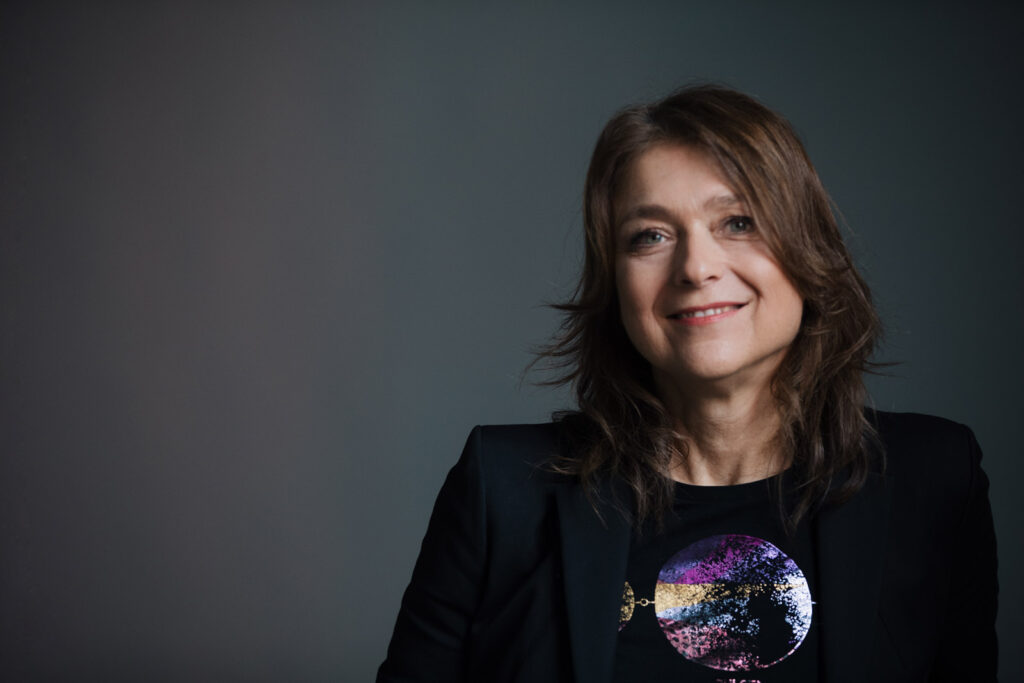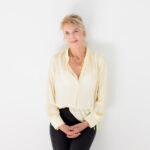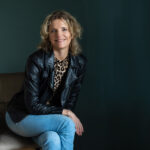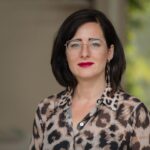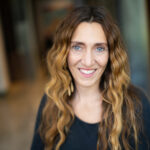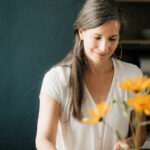“My life has always been with children, even though I don’t have them.”
Iris Pohl (56, Germany)
While growing up, Iris didn’t have a single thought about, nor a desire for, becoming a mother. When asked about her upbringing, she is very clear about this.
I always wanted to be independent and do my own thing. I have felt like this since I was a child. And I grew up like that. My parents were very busy, always working, so from a young age I have been independent and have had to take care of myself. And this is how it has been ever since. I knew from a very young age that being a mother and raising a child, takes time.
She shares that her mother was not the kind of mother who was at home when she got back after school, waiting with a lovingly prepared meal.
I had always seen my mother working and being busy. I grew up with the knowing that work is everything.
How was your relationship with your mother? Did you look up to her?
No. Since very young, my mother always asked me about her clothes when she went out and whether I liked her outfit or not. She asked me for support and advice. I was never treated like a young girl or daughter. I was always seen as a mature person.
Her mother had had her own business, a restaurant/pub, since Iris was seven yours old, where she worked nearly seven days a week.
My mum worked from 11 am till midnight. After school I went to her pub and there were always people that I related to. So, I grew up with a lot of people around me. For me it was normal that there was this pub where I could go to if I wanted to see my mum. It was my living room. And when I turned 13, I started working in the business after school. Since then, I have always been working. I love to work.
There is this picture, that mothers have to be there a lot for their children, for instance when they come home after school. But this is not what you have experienced.
When I was younger, I did have that picture you describe, of wanting a mother who was waiting at home to have lunch with. But later, I realized that because I had a different upbringing, I was very independent. I cooked a lot for myself and learned many things at an early age. I have never felt any imposition or expectations from my parents. And this is something I did pick up on when I went over to see my friends. Many parents had a lot of expectations and were putting pressure on their children in how they had to be. In my twenties I realized that in comparison, it felt freeing that I did not have parents who were imposing on me. My mother was always there if I wanted to see her. But she was not there for me only, she was there for everybody in the pub. So, I had these two extreme ways of parenting around me; one, the mothers of my friends who were home but were imposing, and the other, my own mother, who was there, but who was not taking care of me. She often did not cook for me or help me with my homework.
Was your dad around when you grew up?
No, they divorced when I was very young. Then my mother married again, but that man disappeared as well, after some years. Most of my upbringing she did on her own.
Do you feel your mother struggled to be a single mum, working full-time, and raising you and your sister?
No, I think for her this was normal. She was born in 1939. This was when the second World War started. It was a hard time for her growing up. She did not know any better than that you had to work and do what needs to be done.
Did something change for you at some point with regards to motherhood when you were older?
No, never. I have never wanted to become a mother. From an early age I had a lot of ideas about what I wanted to do, for instance explore the world, travel a lot and I wanted to work a lot. I was very creative with photography, and I loved art. Getting married and having children was too abstract for me.
What do you mean by “too abstract? “
It felt like a very far away thing. A lot of my friends in their twenties had this dream of a white wedding. They wanted to own a house, and a big car, and they were dreaming of having children. They had many dreams and wanted to tick all those boxes. I never had that. I did not want to tick any box. I felt different compared to society’s norms. I did not want a white wedding, a house, or children. I did not feel part of it.
Iris shares about a long-term relationship she was in, which started when she was 24 and ended when she was 31. At some point, in her late twenties, the father of her boyfriend offered them a big house in a very beautiful place in Cologne. The house was part of a family heritage.
He said: “You can move into that house now.” I got so scared and knew instantly: “I can’t live in this house and have this kind of life where we eventually have kids and live together till the end of days.” I ended the relationship and ran away. I could not breathe in that environment, with big houses and rich people.
What happened in that moment for you?
What I experienced, is that your life can get so fixed, which feels like being in a box. To me it felt like death. Not death as in dying, but like being compressed. We split up.
Iris needed a place to live, and her friend and husband offered to let her stay with them until she could find her own new place. The friend was pregnant at the time.
She was more than happy for me to help her with her pregnancy and with giving birth. I ended up staying there for one and half years and was part of this new family. I was very close with her baby. My friend loved it because she did not have to do everything on her own. At some point, I felt to move on, and I went to South America. I wanted to see if I could work and live there. After about half a year, I realized this was not a place where I could stay, and I went back to Germany. This was a shock for me, as it was even more clear how people were living from ticking boxes. Life in South America was so different. Then I faced another challenge because I did not want to have my own flat; my own box. I felt like I had a culture shock compared to South America and could not rent a permanent flat as this felt like a box to me. I moved around into different apartments, already with furniture. Eventually I rented a room in the attic of a woman’s house. She was a single mum who had a daughter. We shared the kitchen and bathroom. I lived there for three years. I became very important to this girl, and I still have a beautiful relationship with her. She is now 24.
What did you learn from that period when you were living with the single mum and her daughter?
I loved it. For me it was so enriching. The child was six at the time. It was amazing to live there and to be another mum for this child. They both loved it that I was there. I did not treat her like a six-year-old but like a friend, like an adult. When you really listen to what young children are saying, they still talk free of boxes. At a young age, children don’t yet have all these expectations from society. I am still like an older sister to her.
After those three years, Iris found her own flat in a place where many people were living close to each other.
It was like a community home, a huge house with a shared courtyard, and we saw each other a lot. I asked some friends to move in as well. One was a couple and their one-year-old daughter. The others were two women. I got to experience, that not only the parents are responsible for the upbringing of their child, but also a wide field of people around them. In that way, the child gets more reflections of how life can be.
Did you feel any pressure in those years from outside, about needing a partner or having children? Or about what your next step in life should be?
Yes, I experienced this a lot. As a teenager and in my early twenties, I did not have a relationship. The long-term relationship I had started when I was 23. And because my life was never about ticking any boxes and I did not have a so-called normal childhood, I was used to having this pressure from outside of me saying I was not living in a way according to what society says is acceptable. But it never really bothered me if people have other expectations of me. It never had an impact.
It never made you go into self-doubt.
No.
You were always very clear about what you wanted?
I was clear that I could not live such a life.
For many women, the pressure can be quite impactful.
Yes, I have always seen this around me. That pressure that you need a place in society, and you have that place as a woman when you have children. Then everybody leaves you alone. But if you don’t tick the motherhood box and you don’t have a husband, a house, a great job, children and all that stuff, you will always experience some sort of pressure from outside. I haven’t had a relationship for many years now and I always get the question: “Why don’t you have a relationship? You are so beautiful.” I understand this question says more about the person asking.
I love how you share the experiences you had with living together and the openness of those people to having you as a support with the parenting. It comes back to the saying: ‘It takes a village to raise a child.’
I did not want to tick the boxes in how you have to live as a woman, and because of that, I got to experience – three times – a constellation with people that involved children. You could say I have three children. But there were also more children around me that were very much part of my life.
There is a lot of love when you speak about those children. It shows that you don’t need your own children to have a mothering quality and love for a child.
We all have those caring and loving qualities, regardless of giving birth or not. There is one experience I would love to share with you. One of my friends was pregnant, as I shared with you, and she asked me to be with her when she was giving birth. This was one of the most amazing experiences I had. The father, the midwife and I were present. Somebody had to cut the umbilical cord. The father was too emotional to do this, so I said: “I will do it.” Then the midwife said, that in history, there have always been women supporting a woman through her pregnancy, the birth and subsequent care of her baby. They are called doulas. The person who cuts the cord is responsible for ensuring that at some point in the child’s teenage years there is no cord from the parents holding the child back in life. You have to let go as parents. After cutting the cord, I felt this responsibility for this child. Way back in our history, we have had periods where communities came together to raise children. I love that. So, there must be something in our cultures that reminds us that we are not meant to parent our children without other people around.
A lot has changed though, as today, we don’t live in a way where a community raises a child. Parenting is far more individualized.
Yes, everybody parents from their own box. There is a father, a mother, and a child, and that is it. The child gets some reflections in school, but that’s it. My feeling is, and this has also been my experience, is that children need more than only the reflection from their father and mother. Of course, there are grandparents and other close relatives, but children need more than that.
When the whole community supports with parenting, this takes the pressure off the parents. Many young mothers experience burn-out and young fathers can often feel overwhelmed. That would be different when the community helps to support them.
Have you ever felt like you missed something or that you were looking for something outside of yourself, because you did not give birth to your own children?
No, never, because I had my children around me. And my life was more about work. The only thing that is interesting now that I am 56, is that people around me say: “I’m glad I have children now that I am getting older so my grown-up children can take care of me.” There is always some kind of pressure that comes with a certain age. “What are you going to do when you are 65 and you go into retirement, and you don’t have children?” people ask me. All this stuff. The ticking of the boxes never stops.
And what do you answer when you get those comments?
I will keep working till I die. I cannot imagine going into retirement. I have always found this a strange concept.
For many people work is not their number one focus, nor does it have the importance and love you have for it. It is more than something we have to do to earn our money.
I have always loved to work because work is being with people. Work is not something I have to do in order to get money. Of course, I get paid, but it’s more about being involved and doing something for, and with, humanity. Work is about working together and for me that is amazing. I love it.
Would you say this is your purpose in life; being with people and working?
Yes, always, and I learned very young that I have to do what I feel to do, and not what society is telling me what to do. I have to live my life.
We all have our own agenda of life and what we need to do. It can be family, it can be work, it can be both. What you need to do comes from the inside, and not from what you get told from the outside.
Has there ever been a desire from your mother for you to have children and to become a grandmother?
My mum died young when I was 29. She had this clear wish for me. She wanted me to have a safe job, with the government, and to have a man and children. She wanted me to have a normal and safe life. Before she died, she was concerned that I did not have that kind of life.
Did this bother you in any way that she wanted this for you?
No, I didn’t care about it. Her wishes had no power over me.
What did you learn from your mother?
She had friends who were gay, and they were all part of our family. Why did people go to a pub in the seventies and eighties? Because they were looking for connection. Many of them wanted to be part of something because they didn’t fit into the norms of society. This is what she did 24/7 for other people: being there for them and giving them space to be, without any judgment. They felt welcomed. What I learned from my mum, and what she offered me, is that I got to see and meet people I normally would not have access to. We never celebrated Christmas with just our family; my mother always invited people. Family is not about your last name or blood; it is much bigger. She taught me to not judge people, regardless of how they look or their sexual orientation. Family is not just blood family. I learned this from a young age.
Who was your role model while growing up?
Nobody was. I had no role models. Later, when I studied design, there was one professor who was my role model. She was somebody who was living what she was teaching. She taught me the difference between emotions and feelings and that I have a responsibility in what I create. Before you do something, you have to check in with yourself from where you do it: either emotions or feelings. It makes a huge difference. This has taught me to read other people, and myself, in their impulses.
Do you think there are enough role models for young girls?
No, there aren’t.
What kind of role models do we need?
We need more true reflections. A true reflection is someone who is doing what she is saying. In other words, a person who is living what she is saying. For teenagers, this is the only thing that counts.
They want to connect with somebody who actually lives what they are talking about. Many people tell teenagers what to do, but don’t live it themselves.
This is why I have been working for the platform True2You from the beginning, so young people have access to something different, to another reflection. This is important for me.
Is there one last thing you would like to share?
When I walk my dog, I often see young women with their babies. This touches me. They always walk on their own. I sense a loneliness around them. But it was never meant to be like this. That is what I want to say. I have no idea how to change this, but I want them to know they do not have to do it on their own. It does not feel true, that as a parent, you are the only one responsible for your child.
So, what is needed as a next step to change this? Having a website like this is a great start, so I can contribute my experience. I have had three experiences where I shared a house with a woman and partner and their child. A mother cannot reflect everything to a child. It needs other people with a different understanding about life. We need to be more involved with other people and their children. I worked for the police for many years, and there I saw that domestic violence is a big thing. It’s happening all over the world. How is this possible and why don’t we feel responsible for it? This to me feels like the next step, that we as women feel responsible for all the children in our environment. Connect with children in your neighborhood. How as women can we not feel fulfilled when we don’t have our own children? We can be a mother for so many children and this to me is so beautiful.
✺
